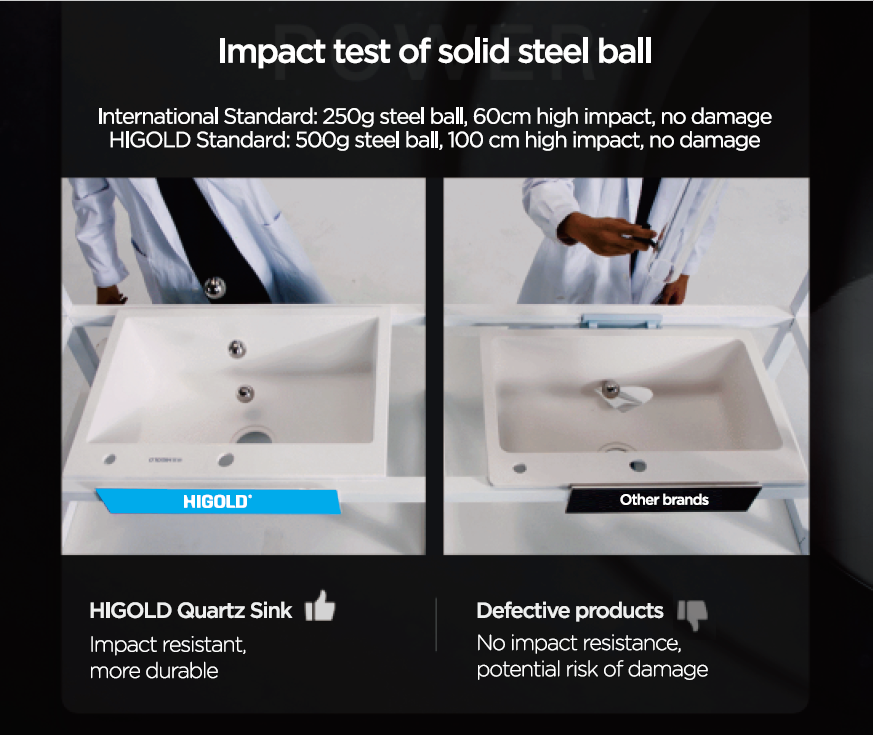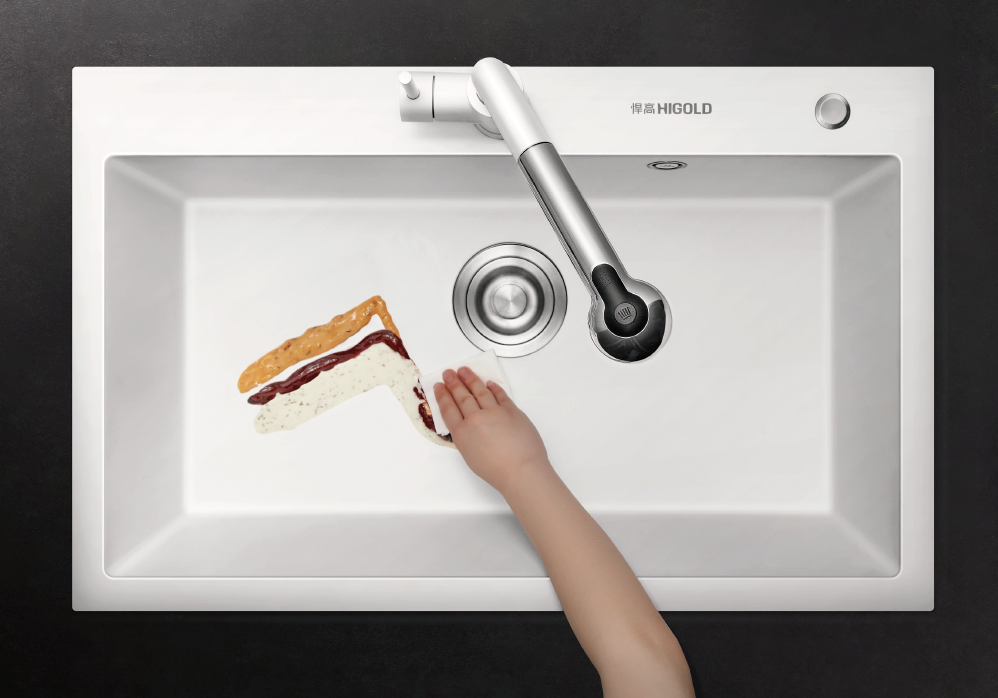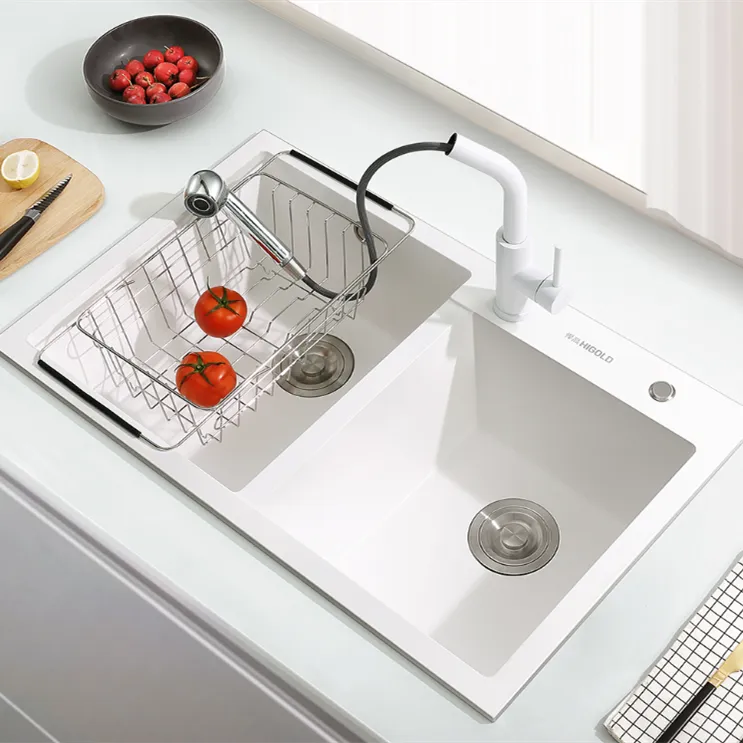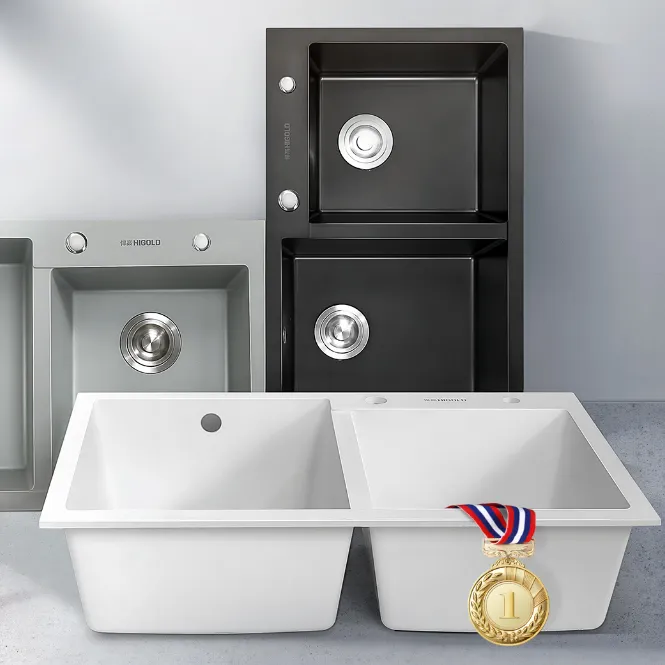In modern home design, the sink, as one of the most important cleaning areas in the kitchen, plays a crucial role in the overall ambiance due to its material and appearance. Quartz sinks, with their high hardness, durability, and diverse appearances, have gradually replaced traditional stainless steel sinks, becoming the mainstream choice for kitchen renovations.
Among them, white quartz sinks, with their clean, bright, and highly designed appearance, have become the first choice for many families and designers. However, when consumers choose white quartz sinks, they often worry about one question: Will white quartz sinks yellow over time?
This question involves many aspects, including material properties, the usage environment, and daily maintenance, and directly affects consumers' purchasing and user experience.
This article will systematically analyze this question, revealing the true performance of white quartz sinks from a professional perspective.

White Quartz Sinks: Material Characteristics
To understand whether white quartz sinks will yellow, we must first start with their material composition.
1. The Role of Quartz Granules
Quartz is a natural mineral, second only to diamond in hardness, possessing excellent wear resistance and corrosion resistance. In white quartz sinks, quartz granules typically account for over 70%, ensuring a hard surface and resistance to scratches.
2. The Role of Resin Materials
Resin is added as a binder to tightly bind the quartz granules. The presence of resin gives the white quartz sink a certain degree of toughness and allows it to be molded into a streamlined structure. However, resin is also the most susceptible to environmental influences, making it a key factor in the "yellowing" problem.
3. White Pigment and Optical Effects
To achieve a bright white appearance, white pigments and additives are added during manufacturing. These components give the white quartz sink a uniform color and good visual effect, but over long-term use, the stability of the pigments can affect whether the sink maintains its pure white color.
4. Overall Characteristics of White Quartz Sinks
• Durable and Scratch-Resistant: Compared to stainless steel, white quartz sinks are more impact-resistant and less prone to dents.
• Aesthetically pleasing: The clean and bright white color easily complements various kitchen styles.
• Excellent water resistance: Under normal cleaning conditions, it is not easily penetrated by liquids.
• Warm and smooth feel: The surface of a quartz sink feels closer to natural stone, enhancing the user experience.
These characteristics make white quartz sinks very popular in the market, but their light color also makes them more prone to subtle changes, especially yellowing.

Will white quartz sinks yellow over time?
From a scientific perspective, white quartz sinks may indeed yellow to some extent with long-term use, but this is not inevitable. The main reason is not the quartz particles themselves, but rather the visual changes caused by resin, pigments, and surface deposits.
In other words, the "yellowing" of white quartz sinks is more of a surface phenomenon than a fundamental change in the material's properties. As long as users understand the causes and take effective measures, this risk can be significantly reduced.
What are the causes of yellowing in white quartz sinks?
To understand the problem thoroughly, we must break down the various factors that cause white quartz sinks to yellow.
1. Resin Aging
Resin is an organic component, and under prolonged exposure to ultraviolet light, high temperatures, and cleaning agents, it may undergo slight changes in its molecular structure. This aging process reduces the resin's transparency, causing it to become dull and even yellowish.
2. Pigment Deposition
During daily kitchen use, dark liquids such as coffee, black tea, soy sauce, and curry may leave pigment residue on the surface of a white quartz sink. Although quartz sinks are relatively impermeable, prolonged neglect can still lead to yellow stains on the surface.
3. Water Quality Issues
Hard water contains a large amount of calcium and magnesium ions, which easily form limescale on the sink surface. If limescale is not cleaned in time, it will gradually turn yellow or grayish-yellow. This deposit is particularly noticeable on white quartz sinks.
4. Kitchen Fumes and Environment
If grease particles from kitchen fumes adhere to the sink surface and are ignored, they will oxidize in the air and turn into a yellow or brown film. This is a major reason why white quartz sinks appear yellowish.
5. Improper Cleaning Methods
Prolonged use of strong acid or alkaline cleaners may damage the gloss of the resin surface, causing the white quartz sink to lose its brightness and appear yellowish.

How Does a White Quartz Sink Yellow?
In actual use, yellowing of white quartz sinks often manifests in the following ways:
1. Localized Yellowing: Such as at the bottom of the faucet, around the drain, or in the seams, where water or residue easily accumulates.
2. Overall Yellowing: After prolonged use, the entire surface gradually changes from pure white to beige.
3. Reduced Gloss: Even if the color does not change significantly, the brightness decreases, making the sink look less clean.
4. Localized Color Difference: Some areas remain white, while frequently used areas appear yellowish, creating a noticeable contrast. These issues not only affect aesthetics but can also create the impression of an untidy kitchen.
How to prevent white quartz sinks from yellowing?
Delaying yellowing of white quartz sinks: The key lies in proper use and maintenance.
1. Maintain daily cleanliness: After each use, it is recommended to rinse immediately with clean water and dry with a soft cloth to avoid stains and water residue.
2. Choose suitable cleaning agents: Use neutral detergents or quartz-specific cleaning products whenever possible, avoiding the use of chemicals containing strong acids or alkalis.
3. Promptly treat pigment stains: After spilling dark liquids such as coffee, tea, or soy sauce, clean them up immediately to prevent pigment adhesion.
4. Regular deep cleaning: Every so often, a cleaning paste made of baking soda and warm water can be gently wiped on the surface to help remove shallow deposits.
5. Reduce direct sunlight: If the kitchen has strong natural light, it is recommended to install curtains or blackout curtains near the sink to prevent accelerated aging of the resin. 6. Pay attention to water quality: For users in areas with hard water, consider installing a water softener to reduce mineral buildup.

Will white quartz sinks turn yellow?
Yes, white quartz sinks do have a certain risk of yellowing over time. However, don't worry too much, as this change mainly stems from resin aging, pigment deposition, water quality issues, and improper cleaning methods, rather than a change in the quartz particles themselves. In other words, the intrinsic performance of white quartz sinks remains stable, and the yellowing problem can be completely avoided or delayed through proper use and maintenance.
White quartz sinks, with their unique aesthetics and practicality, remain an ideal choice for kitchen renovations. For consumers, mastering daily maintenance points will allow white quartz sinks to remain clean and bright for a long time, avoiding the "yellowing" problem.
How does Higold support promotions and seasonal sales for distributors?
Higold provides special promotional pricing and wholesale discounts to support distributors’ seasonal campaigns. We understand the needs of retail markets, so we help partners boost sales with affordable bulk purchasing and high-quality ODM products. Buyers can request promotional quotes, take advantage of low price deals, and buy directly from our factory for maximum profitability.


